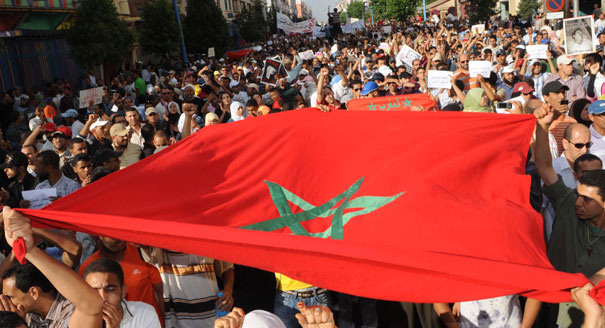Registration
You will receive an email confirming your registration.
IMGXYZ3824IMGZYXCivil society is one of the key pillars of democratic governance, and countries aspiring to an inclusive and transparent political and economic process must empower their citizenry. Since the onset of the Arab Spring, interactions between the state and protest movements in the Middle East and North Africa have grown in number and prominence. To discuss the changes and challenges facing the emerging civil society in Morocco, the Carnegie Middle East Center and the Dutch Institute in Rabat (NIMAR) co-hosted a discussion with Hachimi Mohamed from the Centre des Etudes et de Recherche en Sciences Sociales (CERSS) in Rabat, Rachid Touhtou from the National School of Statistics and Applied Economics (INSEA), and Karim El Hajjaji of the NGO Cap Democracy Maroc. Carnegie’s Lahcen Achy moderated the event.
Morocco’s Arab Spring
- Social Media Origins: Morocco’s Arab Spring moment, known as the Movement of February 20th, was organized through Facebook and quickly moved to the streets under the slogan “People want to Fight Corruption,” explained Hachimi.
- New Dynamism: With the advent of the Arab Spring and the February 20th movement, many new protest groups and organizations have emerged in Morocco. The surge in number and diversity of groups–including feminists, Amazigh, human rights activists, youth, and Islamists-created a dynamism in Morocco’s public sphere that didn’t previously exist, Touhtou argued.
The King’s Reaction
- Quick Reaction: The Moroccan regime, led by head of state and commander of the faithful King Muhammad VI, reacted quickly to the pressures and demands of February 20th protestors, explained Mohamed. Among the monarchy’s initiatives were constitutional reform, a referendum to vote, early elections, and the appointment of Abdelilah Benkirane, leader of the Islamist PJD party, as Head of Government.
- Hopes Unfulfilled: Despite these reforms, many protestors are unsatisfied. Street demonstrations have continued, and have been met alternatively with force or toleration. Finding a middle ground between the demands of the government, protestors, and political parties is nearly impossible, Hachimi argued, resulting in a zero-sum game and little headway made towards democratization. El Hajjaji agreed, adding that bargaining between political actors and civil society activists from his NGO, Cap Democracy Maroc, had been a struggle for both sides.
Outlook for the Future
Although the efficacy of new organizations remains to be determined, Touhtou stressed the historical significance of these new civil society organizations and protest movements. He added that they may help bridge the gap between public and private spheres and formal and informal ways of doing politics in Morocco.
